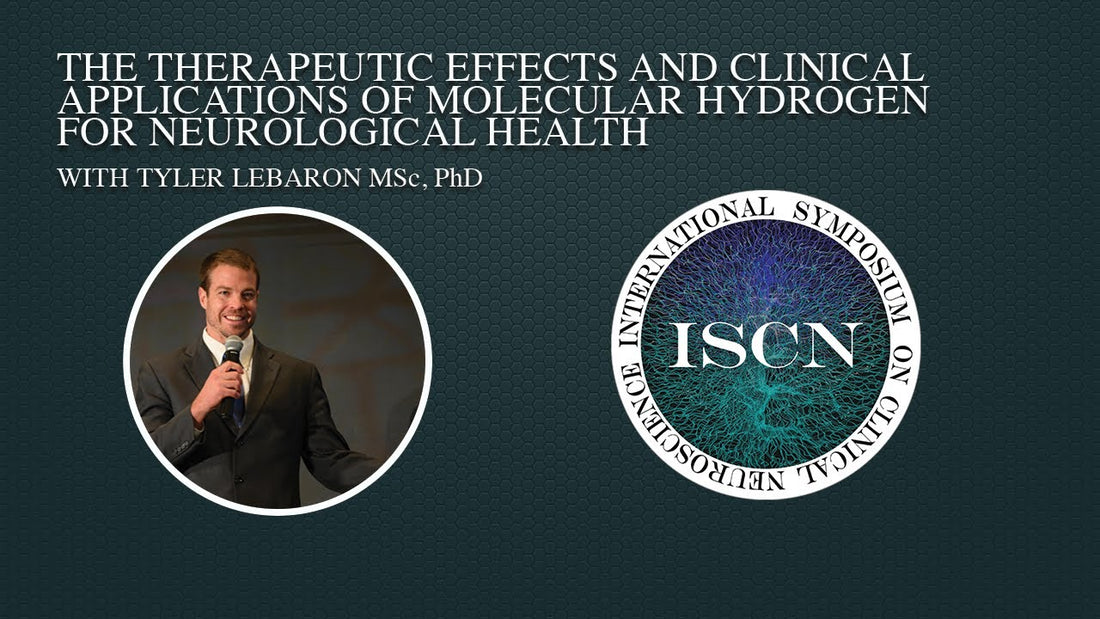
Molecular Hydrogen for Neurological Health - Dr. Tyler LeBaron
Share
Unlocking the Potential of Molecular Hydrogen for Neurological Health
Molecular hydrogen is emerging as a groundbreaking therapeutic tool with immense potential for neurological health. As the smallest molecule in the universe, hydrogen gas can easily penetrate cell membranes, mitochondria, and even the blood-brain barrier. Its powerful antioxidant and anti-inflammatory properties have been linked to benefits across a wide range of conditions, including Alzheimer’s, Parkinson’s, and other neurodegenerative diseases.
Recent research highlights over 2,000 scientific publications and 100+ clinical studies demonstrating hydrogen’s therapeutic effects on nearly every organ in the human body. With applications spanning metabolic disorders, cardiovascular health, and neurological diseases, this natural, safe, and effective molecule is revolutionizing the way we approach health and wellness.
If you’re a clinician or health enthusiast, now is the time to explore the benefits of molecular hydrogen therapy. Dive deeper into this exciting topic by watching the attached video, where Dr. Tyler Leber shares valuable insights about the therapeutic effects and clinical applications of molecular hydrogen for neurological health.
In this video, Dr. Tyler discusses how molecular hydrogen functions as a novel medical gas, highlighting its ability to cross barriers that many drugs cannot and its profound impact on signal transduction pathways. This transcript is also available below to ensure you don’t miss any critical points.
Stay ahead of the curve in cutting-edge health therapies and discover how molecular hydrogen could transform patient outcomes and personal wellness.
Watch the video to learn more, and feel free to leave your thoughts or questions in the comments!
The transcript of the video:
Molecular Hydrogen for Neurological Health
Dr. Garcia: My name is Dr. Freddie Garcia, and today I’m joined by Dr. Tyler LeBaron thank you for joining me today!
Dr. LeBaron: Oh thank you very much
Dr. Garcia: Dr. LeBaron, we’re shooting this quick video today because you’re presenting at this year’s ISCN (International Symposium on Clinical Neuroscience) on the topic is: The Therapeutic Effects and Clinical Applications of Molecular Hydrogen for Neurological Health.
Now, molecular hydrogen is something I’ve recently learned about, and I’m learning more and more about it. It’s piqued my interest a great and a great amount. So, Dr. LeBaron, my question for you is: why is it important for scholars to learn more about molecular hydrogen, and why did you choose the topic in the first place?
Dr. LeBaron: Yeah, absolutely. So, molecular hydrogen turns out to be a noble medical gas. So, we think about nitric oxide and many other gases that have therapeutic effects. Molecular hydrogen is one of those, and it’s the smallest molecule in the universe, that's going allowing it to penetrate cell membranes, and enter into the mitochondria, the nucleus goes to the blood-brain barrier all these places that a lot of uh... drugs or nutraceuticals can’t actually go to.
And there, it turns out that hydrogen gas has antioxidant and anti-inflammatory effects and a lot of other really amazing effects on signal transduction pathways and also protein phosphorylation cascades it's.
It’s really an amazing area and there’s now over 2,000 publications on the therapeutic effects of hydrogen gas, over 100 human clinical studies. Essentially, hydrogen has been shown to be therapeutic in every organ of the human body. So, it’s super exciting.
And, when we look at some of the disease models and human studies that have been investigated, we’re talking about immediate medical applications that people can use for their patients right now. So, metabolic conditions, cardiovascular conditions, neurological conditions—you know, from Alzheimer’s, dementia, Parkinson’s—you just list all these areas. Like I said, 170 different diseases have been studied on this.
And hydrogen is the simplest molecule, and it’s safe. So, it’s not some alien, foreign, toxic pharmaceutical. Anybody can try this. It’s natural to our bodies. So, I’m super excited to educate and explain all the clinical effects that you can use for your life and for your patients.
Dr. Garcia: You’re absolutely right. This is incredible. Of course, you’re right because, listen, I know you’re one of the experts when it comes to molecular hydrogen. But I’ve been doing a deeper and deeper dive as I peel the layers of the onion on molecular hydrogen, and I’ll look up a condition in molecular hydrogen, and guess what—there’s a paper, and I keep reading more and more of these, so it’s like I think this is going to be absolutely huge. And I think your presentation is going to be received very, very well. I think you’re going to open the eyes of many clinicians who are going to be learning about molecular hydrogen for the first time.
If this presentation piques your topic, you’re going to want to visit the website to learn more about the ISCN. The website is carrickinstitute.com
Dr. LeBaron Thank you so much for your time today. I really appreciate it.
Dr. LeBaron: My pleasure Dr. Freddie. Thank you.
If you’ve tried molecular hydrogen therapy and seen improvements, we’d love to hear from you. Please contact our team at care@h2max.com to share your experiences.
All rights reserved to Dr. Tyler LeBaron, Dr. Freddie Garcia, and their respective institutions.